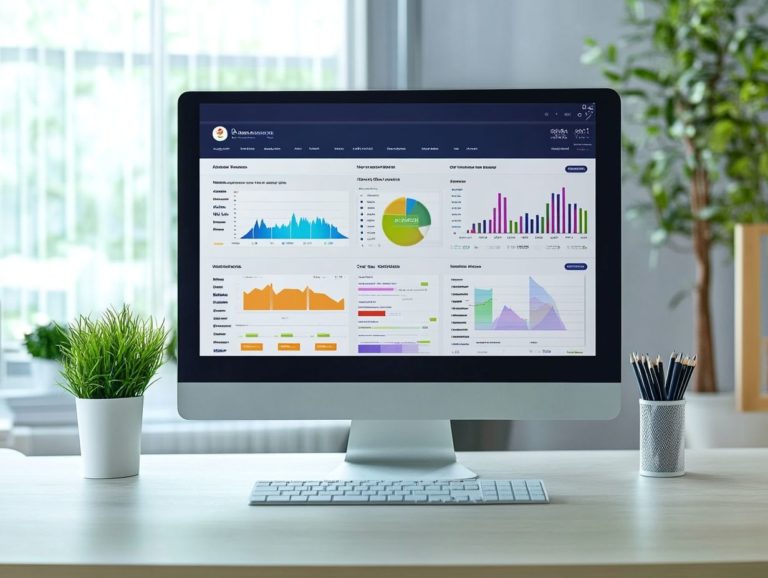What is a CRM User Role?
In today s fast-paced business environment, grasping CRM user roles is vital for maximizing your team s efficiency and safeguarding sensitive data. Ready to boost your CRM strategy? Let s dive in!
Each role be it admin, sales, marketing, or customer service plays an essential part in effectively leveraging CRM systems.
This piece delves into the definition and significance of CRM user roles, outlines the various types, and offers a step-by-step guide on how to assign them. Discover how well-structured user roles can transform your CRM experience!
Contents
Key Takeaways:

- CRM user roles are specific permissions and responsibilities assigned to individuals within a CRM system.
- There are various types of CRM user roles, such as admin, sales, marketing, and customer service, each with unique access and capabilities.
- Assigning user roles in a CRM system can be done through a step-by-step guide, ensuring efficient team management and data security.
Understanding CRM User Roles
Understanding CRM user roles is crucial for optimizing your data management and ensuring that team members like your marketing manager, sales manager, and customer support representatives can work well with customer data while safeguarding its security.
By clearly defining user roles and access levels, you can enhance your workflow management and communication. This ultimately drives performance metrics and achieves your business goals.
Well-defined roles also play a significant role in maintaining data integrity and ensuring compliance with regulations. They ensure that access controls are properly enforced across all user groups.
Definition and Importance
The definition and significance of CRM user roles revolve around ensuring that each team member has the appropriate level of data access. This is vital for maintaining data security and achieving your business objectives.
When roles are clearly defined, your organization can effectively segment responsibilities. This leads to more efficient management of customer interactions and workflows.
By establishing different access levels, your CRM system can safeguard sensitive information while allowing users to perform their specific tasks effortlessly. Role definitions empower administrators to dictate who can view, edit, or share data, significantly minimizing the risk of unauthorized access.
This approach protects customer information and enhances collaboration among teams. It aligns individual responsibilities with the broader goals of your organization.
As various departments leverage their distinct user roles, they can come together to create a unified customer experience. This ultimately drives growth and elevates customer satisfaction.
Types of CRM User Roles
In a CRM system, you ll encounter a range of user roles that are essential to its functionality. This includes:
- Sales Manager
- Marketing Manager
- Sales Representatives
- Customer Support Representatives
Each role is designed with distinct responsibilities and access levels in mind. This diversity in roles gives the power to organizations to manage customer interactions effectively, ensuring that every team member can access the precise data they need to excel in their functions.
Admin, Sales, Marketing, and Customer Service Roles

In a CRM (Customer Relationship Management) environment, your primary roles include admin, sales, marketing, and customer service. Each role meets specific organizational needs and manages user permissions carefully.
As an admin, you oversee access controls and manage user groups to ensure everything runs smoothly. Sales managers focus on seizing sales opportunities. Marketing managers run effective campaigns, and customer support representatives engage in meaningful interactions with clients.
These distinct responsibilities streamline workflows and guarantee that sensitive information remains secure, accessible only to authorized personnel. For instance, in your admin role, you configure permission settings that dictate who can view, edit, or delete critical data, thereby safeguarding customer information and enhancing data privacy.
Sales and marketing team members use CRM data to track performance metrics, measure campaign effectiveness, and optimize sales strategies. All of this has a direct impact on the business s bottom line.
Meanwhile, customer service representatives utilize this data to gain insights into client needs. This allows for personalized interactions that boost satisfaction and retention rates, ultimately driving greater efficiency throughout the organization.
How to Assign User Roles Effectively
Assigning user roles in a CRM system is crucial for proper data access and effective workflow management. This process aligns user permissions with your organizational hierarchy.
By adopting a systematic approach, you can assign roles tailored to user responsibilities. This ensures that everyone has the necessary access levels while upholding data security and integrity.
Thoughtfully assigning roles boosts your operations and keeps everything running smoothly.
Step-by-step Guide
A comprehensive guide to assigning user roles in a CRM system begins by evaluating user needs, defining access levels, and implementing stringent access controls to protect data integrity. Each step is critical to ensure that users can perform their tasks effectively while remaining compliant with regulations.
To start, assess the specific responsibilities and workflows of each user. This foundational step is essential in understanding what each user truly requires.
Next, establish clear permissions tailored to each role. Ensure users have access to the necessary features without compromising sensitive information. This balances functionality and security perfectly.
Once these roles and permissions are clearly defined, implement robust access controls. This guarantees that only authorized personnel can access specific data, safeguarding against unauthorized access.
Finally, regular monitoring of user interactions is crucial. This vigilance helps maintain ongoing compliance with data privacy regulations and allows administrators to adapt role definitions in response to organizational changes. This ensures the system remains efficient and secure.
Benefits of Using CRM User Roles
By leveraging CRM user roles, you can immediately unlock many benefits, including efficient team management and heightened data security. This combination streamlines your business operations and enhances your performance metrics.
When you establish clear roles within your organization, you ensure compliance with regulations, maintain data integrity, and cultivate a culture of accountability among your team members.
Best Practices for Managing CRM User Roles

Implementing best practices for managing CRM user roles is essential for safeguarding data privacy, establishing robust access controls, and optimizing user responsibilities throughout your organization.
- Effectively manage permissions to ensure security.
- Streamline workflow creation to enhance efficiency.
- Encourage collaboration among team members.
- Minimize risks associated with data access.
This strategic approach protects sensitive information and fosters a more efficient and cohesive working environment.
Tips for Effective User Role Management
Manage user roles effectively in your CRM. This enhances data security and boosts overall performance.
Regularly review user roles and permissions. This ensures employees have the right access while maintaining data integrity.
Regular audits of user access levels are crucial. They help identify discrepancies or outdated permissions.
Train employees on secure data handling. This increases awareness and builds a culture of accountability.
As your business evolves, adapt user roles. Consider shifts in responsibilities or project demands.
Use continuous feedback to refine these roles. This ensures your CRM operates securely and effectively.
Frequently Asked Questions
What is a CRM User Role?
A CRM (Customer Relationship Management) User Role is a defined set of permissions that determines what a user can view, edit, and perform within the CRM system. To understand more about this, including the role of a CRM administrator, it helps organize and control user access based on job responsibilities.
Why is it important to define CRM User Roles?

Defining CRM User Roles maintains data integrity and ensures security. By setting permissions, businesses control who can access sensitive information.
What are some common CRM User Roles?
Common CRM User Roles include Sales Representative, Sales Manager, and Customer Service Agent. Specific roles may vary by industry.
How are CRM User Roles assigned?
CRM User Roles are assigned by the CRM administrator. They can assign roles to users or groups based on job responsibilities.
Can CRM User Roles be changed or modified?
Yes, CRM User Roles can be modified anytime by the administrator. Review and test changes to ensure proper system function.
How can I determine which CRM User Role is right for me?
The right CRM User Role depends on your job responsibilities. Consult with the CRM administrator to find the best fit.






